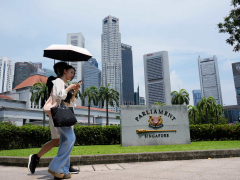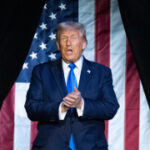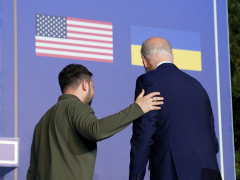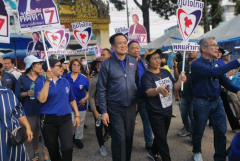Singapore – David Wee has lived in the same terrace house with his family in the east of Singapore his entire life.
But over more than 40 years, the Wee family have been a part of five different electoral constituencies.
Singaporean electoral boundary changes occurring shortly before every general election have led government critics to raise accusations of gerrymandering – deliberately manipulating constituency boundaries to favour a particular political party.
According to Singapore’s Elections Department, which is overseen by the Prime Minister’s Office, the latest boundary changes – the most extensive in years – were driven by voter growth and future housing developments.
Despite the criticism, Saturday’s election in Singapore – where some 2.76 million people are scheduled to vote – is set to return the long-ruling People’s Action Party (PAP) to power.
The PAP has won every election in this prosperous global financial centre since declaring independence in 1965.
While there is little danger of the PAP losing power, elections here are seen as a test of public sentiment towards the ruling party. This election is also seen as a referendum on Prime Minister Lawrence Wong, who took over from former premier Lee Hsien Loong last year.

Voting is also compulsory in Singapore – where elections are held every five years, and though modelled after the United Kingdom’s Westminster parliamentary system, one of the quirks of Singapore is that voters are either part of a single-member voting constituency or a Group Representation Constituency (GRC).
People in a GRC, rather than vote for individual candidates, cast their ballots for teams of up to five politicians. Within each team, at least one candidate must be from a minority ethnic group.
Authorities say the team vote is to ensure minority representation in the city-state’s parliament, but critics say it is a means of parachuting new candidates into the legislature as part of a group.
The vote will see 97 members of parliament elected in 33 constituencies made up of 15 single-member constituencies and 18 GRCs. But with no opposition to contest one of the GRCs, the PAP has already scored a walkover for a five-member team, meaning just 92 seats will be contested today.
For David Wee, constituency boundaries are not really an issue.
“It’s something that can happen to anybody, especially if you live in a Single Member Constituency, which can be easily absorbed” into a GRC, he told Al Jazeera.
What is an issue though, he says, is the rising cost of living, inflation, and other concerns around life and work in one of the world’s richest nations.
“I will support whomever I think can serve the residents well,” he said, adding that Singapore’s voters are more discerning now and should not be taken for granted.
“Our voters have become more educated,” he said.
Singapore, after all, is “a developed country, not a developing country”, he added.

Singapore bling
Singapore is one of the world’s most expensive cities, with some of the highest living standards globally.
Alongside a world-class public transport system, it also has the most expensive cars in the world, thanks to a licensing system that sees owners shell out tens of thousands of dollars simply for the right to own a vehicle, alongside congestion pricing, road tax and other expenses.
“If you can’t afford it, you can’t afford it,” said Lim Meng Wee, 57, a consultant in the local real estate capital field who has owned several cars over the years.
“A car is a very expensive luxury. It eats into your balance sheet and you will have to keep working harder. I know of people who bought a car, and within two to three years, they were back to public transport,” he said.
Singapore’s economic success, generally low crime and expectation of personal safety for citizens has come in tandem with a low tolerance for dissent.
That has been enforced by wide-ranging laws that allow for, among others, penalties for wounding racial and religious feelings, as well as detention without trial. Labour strikes are outlawed too, and a permit is required for demonstrations, which is strictly observed.
One prominent dissident who held up a cardboard sign with a smiley face outside the State Courts in 2020 to make a symbolic point about the administration of justice was fined for illegal assembly.
In February, six people in their 20s were questioned by police and had their electronic devices seized over a protest at a local university against Israel’s war on Gaza.

Critics and media outlets have been the subject of defamation lawsuits by government ministers, while many politicians and activists were imprisoned from the 1960s into the 1980s.
In addition, the mainstream media is solidly pro-establishment while the country is ranked 123rd in the world in terms of press freedom. All media outlets must tread carefully with a government accustomed to taking matters to court when unhappy with coverage.
Two ministers recently launched a defamation lawsuit against Bloomberg News – which is continuing – over an article about multimillion-dollar property transactions in the country.
In August, this multicultural, multilingual island nation of about six million celebrates its 60th year of independence.
It turns 60 as an economic heavyweight, and one of the cleanest, safest, least corrupt places in the world. Gross domestic product (GDP) per capita in 1965 was about $500. Last year, figures from the International Monetary Fund showed the figure was about $93,000.
All this has been accomplished under the PAP, which was co-founded by the country’s first premier Lee Kuan Yew, and which remains the only governing party Singaporeans have ever known.
Over those six decades, Singapore’s version of the social compact has seen its citizens accepting fewer freedoms in exchange for the PAP ensuring stable economic growth and the availability of good jobs. But that appears to be changing.
The PAP has held a parliamentary supermajority for decades, though the 10 opposition politicians elected at the last election in 2020 represented an all-time high in parliament and forced some soul-searching among the governing party’s leadership.
“All that we see here in Singapore, Lee Kuan Yew’s (generation) delivered,” political analyst and former newspaper editor PN Balji said.
“He was a great statesman,” he told Al Jazeera.

However, increasingly, Singaporean voters want a greater say in governance and eschew the “fist in velvet glove





